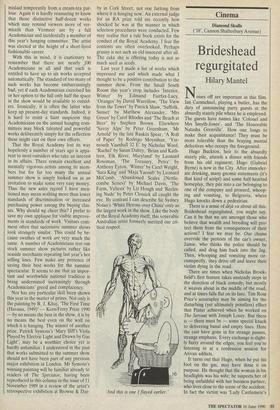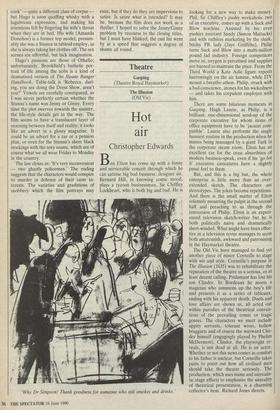Cinema
Diamond Skulls (`18', Cannon Shaftesbury Avenue)
Brideshead regurgitated
Hilary Mantel
Noises off are important in this film. Ian Carmichael, playing a butler, has the duty of announcing party guests at the absurdly stately pile where he is employed. The guests have names like 'Colonel and Mrs Smyth-Jones', and 'The Honorable Natasha Grenville'. How one longs to make their acquaintance! They must be more tolerable than the braying mental defectives who occupy the foreground.
Hugo Buckton, heir to the absurdly stately pile, attends a dinner with friends from his old regiment; Hugo (Gabriel Byrne) is now in the City. After immoder- ate drinking, many gnomic statements (it's that kind of script) and some half-hearted horseplay, they pile into a car belonging to one of the company and proceed, whoop- ing and vomiting, to Belgravia, where Hugo knocks down a pedestrian.
There is a sense of (kid vu about all this: Brideshead regurgitated, you might say. Can it be that we are amongst those who believe that wealth and breeding will pro- tect them from the consequences of their actions? I fear we may be. Our chums override the protests of the car's owner, Jamie, who thinks the police should be called, and drag him back into the Jag. Then, whooping and vomiting more cir- cumspectly, they drive off and leave their victim dying in the road.
There are times when Nicholas Brook- field's first feature takes unsteady steps in the direction of black comedy; but mostly it weaves about in the middle of the road, and at times falls flat on its face. Tim Rose Price's screenplay may be aiming for the disturbing (yet ultimately pointless) effect that Pinter achieved when he worked on The Servant with Joseph Losey. But there is — there must be — some special knack to delivering banal and empty lines. Here the cast have gone in for strange pauses, strange emphasis. Every exchange is slight- ly fuzzy around the edges; you feel you're listening in at a confession session for Ativan addicts.
It turns out that Hugo, when he put his foot on the gas, may have done it on purpose. He thought that the woman in his headlights was his wife; he suspects her of being unfaithful with her business partner, who lives close to the scene of the accident. In fact the victim was 'Lady Castlemere's cook' — quite a different class of corpse but Hugo is soon quaffing whisky with a lugubrious expression, and making his intentions felt by fingering his wife's throat when they are in bed. His wife (Amanda Donohoe) is a former top model; presum- ably she was a Stunna in tabloid employ, as she is always taking her clothes off. The sex scenes are effortful, but lack imagination.
Hugo's passions are those of Othello; unfortunately, Brookfield's bathetic por- trait of life among the nobs is a kind of dramatised version of The Sloane Ranger' Handbook. Table-talk is 'Rebecca, darl- ing, you are doing the Dress Show, aren't you?' Vowels are carefully constipated, so I was never perfectly certain whether the Stunna's name was Jenny or Ginny. Every time the plot swerves towards the sinister, the life-style details get in the way. The film seems to have a translucent layer of yearning between itself and reality; it looks like an advert in a glossy magazine. It could be an advert for a car or a pension plan, or even for the Stunna's sheer black stockings with the sexy seams, which are of course what we all wear Friday to Monday in the country.
The law closes in: `It's very inconvenient — two ghastly policemen.' The ending suggests that the characters would conspire to murder in defence of their caste in- terests. The varieties and gradations of snobbery which the film portrays may exist, but if they do they are impervious to satire. Is satire what is intended? It may be, because the film does not work as a thriller. I hoped to solve the Jenny/Ginny problem by recourse to the closing titles, but I must have blinked; the cast list went by at a speed that suggests a degree of shame all round.



















































 Previous page
Previous page